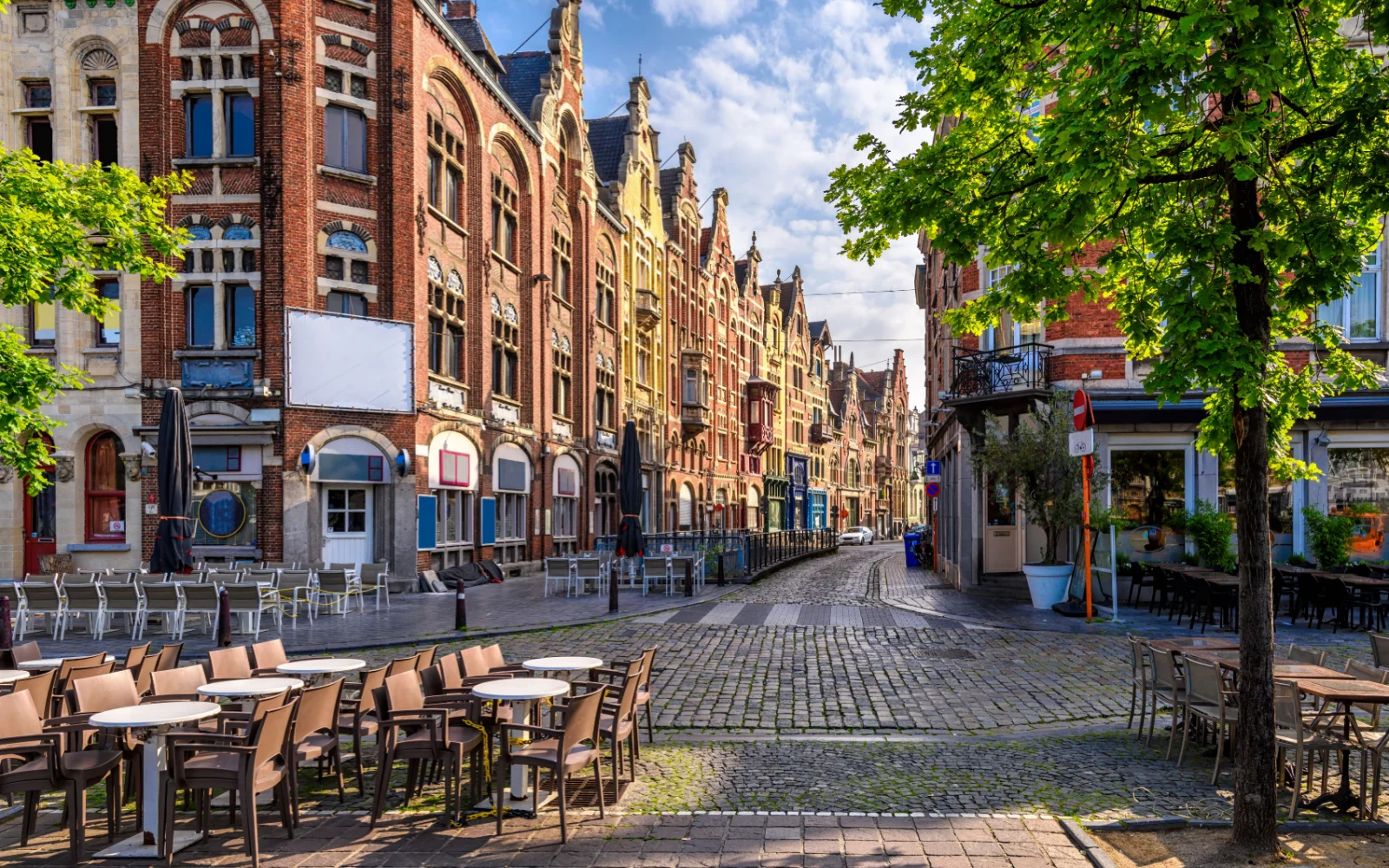The country of Belgium is a great destination for a European getaway. 42.5 million people agree — that’s how many people on average visit this picturesque country each year.
Lovers of architecture and history will get a kick out of the cozy medieval, canal-filled town of Bruges (as will fans of the cult film In Bruges).
No trip to Belgium is complete without a stop in the capital, Brussels, to look at the medieval guild halls surrounding the Grand Place and the iconic Atomium.
Of course, you have to check out the country’s famous gastronomical products during your visit such as the beer, waffles, chocolate, and fries — invented here, not in France, despite their name.
With all that there is to see and do, you probably want to join the millions of annual visitors as soon as possible. However, even with a place that seems as idyllic as Belgium, it’s a good idea to research safety first.
You don’t want to show up to a new country not knowing which precautions to take in order to stay safe. That’s why we put together this travel guide to let you know how to stay safe in Belgium!
Is Belgium Safe to Visit in 2025?
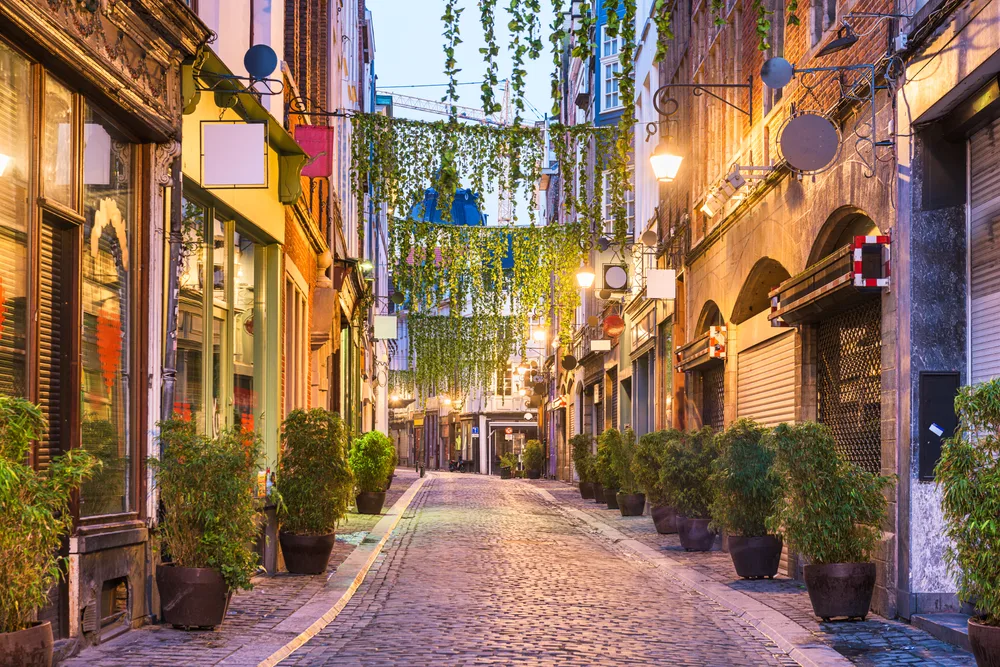
Sean Pavone/Shutterstock
Yes. Belgium is a safe country to visit, and most travelers have a great time when they are in town. As anywhere else in Europe, you should take precautions to protect yourself from pickpocketing.
Some unlucky travelers have been caught up in terrorist attacks before, but terrorism is rare (although it features prominently in most travel advisories).
Many people are nervous about traveling to Belgium because it is in Western Europe, a region of the world that has seen several mass terrorist attacks over the past decade. Belgium itself has experienced these problems.
In fact, terrorism is the main reason countries such as the United States cite when advising citizens to exercise increased caution in Belgium. Other countries such as New Zealand also place Belgium under a Level Two travel advisory.
Besides terrorism, these countries cite other problems in their travel advisories such as:
- Bag snatching
- Passport theft
- Pickpocketing
- Tourist scams
- Theft from vehicles
- Mugging
- Verbal harassment
Crime incidents are obviously more common in bigger cities. Exercise the same precautions that you would use at home, and you should be fine.
With so many crimes listed as possibilities as well as the threat of terrorism, you might be wondering why people visit Belgium at all!
However, keep in mind that in travel advisories, your government has to advise you about the possibility of anything that might happen, not what is certain to happen. The probability of any of these events occurring while you are there is low.
Belgium tends to experience civil unrest, especially in the capital Brussels. This city is home to international institutions such as the European Union and often hosts big international events that attract protests.
Protests, demonstrations, and even riots break out sometimes in Belgium, such as during Morocco’s defeat of Belgium at the World Cup 2022.
The game had tense connotations due to the large North African immigrant population in the country, which often feels segregated and discriminated against by the government.
Protests in Belgium don’t always turn violent, but they can escalate into violence. It is better to get out of the way when you notice a large crowd gathering as you don’t know what could escalate.
It’s also a good idea to read the news before you go to see if there are any events that might trigger a protest, such as a visit by an international dignitary.
Crime in Belgium
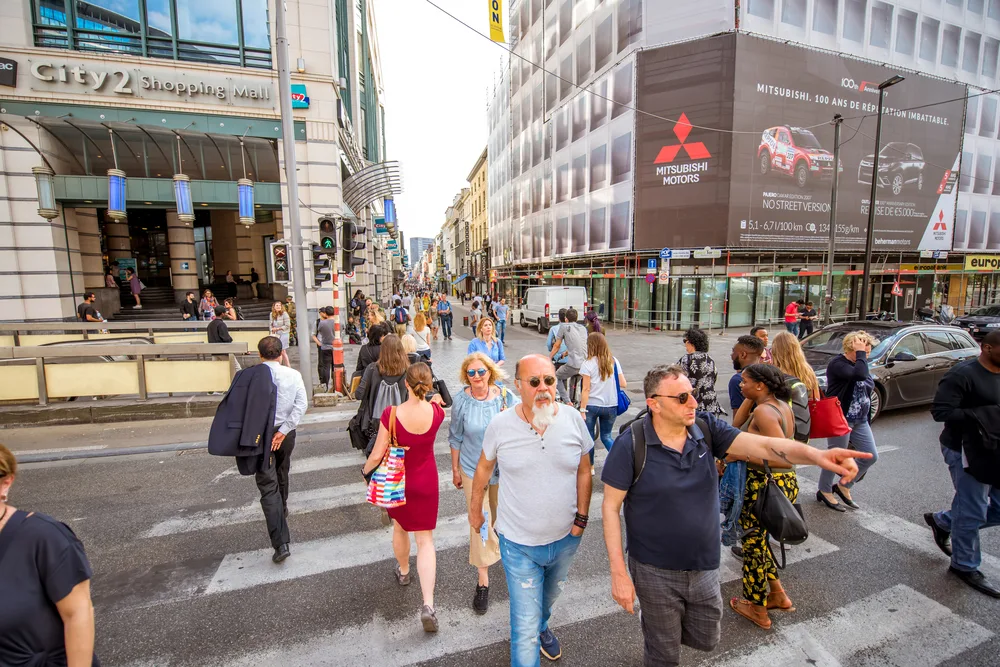
RossHelen/Shutterstock
Whenever you go to a new place, it’s a good idea to research crime. Belgium is no different. Although the country doesn’t have a very high crime rate, crime does occur, especially in certain urban areas.
In 2021, the Belgian police registered about 867,000 total crimes reported. For context, the population is over 11 million, which means that this is a low to moderate crime rate for a small but densely populated country.
The crime decreased drastically in 2021 compared to previous years, but that’s probably due to the coronavirus lockdowns. According to crime statistics, the most common crime in Belgium is theft and extortion.
Various forms of property crimes, including bicycle thefts, vehicle thefts, and petty street crime, are the most common type of crime, even though property crime has been declining in the country over the past few years. The vast majority of incidents are nonviolent.
Violent crimes make up just a small fraction of Belgium’s overall crime total. For example, weapons and explosives-related offenses make up just 1.8% of total reported crimes.
The homicide rate is also very low. In 2021, it was just 1.1 incidents per 100,000 people, showing that the rate of violent crimes in the country is fairly low.
Many violent crimes in Belgium are perpetrated by the foreign mafia groups or local criminal syndicates that are responsible for much of the country’s organized crime such as drug trafficking (due to its location and ports, it’s a popular transit country for the European drug trade).
What do all these statistics mean for the average visitor? They mean that your likelihood of encountering a criminal incident is very low.
The heavy crime that occurs is usually confined to certain neighborhoods and urban areas where tourists rarely venture. If you do encounter crime on your visit, it will most likely be a form of petty theft.
Terrorism may be the crime that grabs the headlines and dominates travel advisories for Belgium, but you are extremely unlikely to experience an incident like that while in town, which you can see from the low homicide rate.
Petty Theft
Petty theft is the most likely crime you will encounter. This form of crime is common anywhere where tourism is popular or there are lots of crowds, including in Belgium’s big cities and popular towns.
The Canadian government warns about the risk of petty crime in its travel advisory for Belgium. Common forms of petty crime you might encounter are pickpocketing and purse snatching.
Less common but still prevalent forms of petty crime are passport and ID theft, theft from vehicles, and tourist scams. Thefts often occur in crowded places and places that attract a lot of tourists.
The Australian government includes a list of popular locations for petty theft in its travel advisory for Belgium. Be careful at popular tourist locations in Brussels and smaller towns such as Bruges, Ghent, and Antwerp.
Thieves often prey on locations that attract a lot of tourists, and the crowds provide cover for theft. Public transportation is also a popular location for theft.
Be careful on the Brussels metro, on intercity trains, and around the major train stations in Brussels. Intercity bus stations, airport waiting areas, and public transportation routes to and from the airports are also popular targets.
Basic precautions are important if you want to deter potential thieves in Belgium. Never, ever leave your things unattended, even in a place that feels safe such as your train compartment or a hotel lobby.
Put valuables in a secure location, such as a money belt or cross-body bag. You don’t want to keep important items in a place where a thief can easily access them.
Tourist scams are common in Belgium, especially around popular tourist attractions such as the Brussels city center.
The most common scams are the same ones that you will find around Europe, such as taxi drivers overcharging, restaurants returning improper change, or pickpockets using distraction tactics such as spilling stuff on people as an excuse to rob them.
Theft from vehicles is unfortunately increasing. Thieves will smash car windows, including when people are sitting in traffic, to steal items.
The best way to avoid this crime is not to have a car. Belgium has an excellent public transportation system, and you don’t need to rent a car to get around, even if you are visiting the countryside.
Terrorism
Terrorism is the crime that you will most often encounter in travel advisories about Belgium. The New Zealand government lists it as the reason why its citizens should exercise increased caution in Belgium.
The travel advisory also includes a list of prominent terrorist attacks, including an explosives attack in March 2016 that killed dozens of people in Brussels and the May 2018 shooting spree in Liege.
The UK government offers more details about the threat of terrorism in Belgium in its travel advisory for the country. Most attacks in the country are linked to Islamist extremist groups such as ISIS (Daesh), although there is an uptick in far-right terrorism.
Targets are usually government buildings or representatives of government authority such as police officers, although crowded public areas have also been targeted.
However, it’s important to put the risk of terrorism in context. There was an increase in terrorism in the mid-2010s, but it has decreased significantly as Belgian police stepped up anti-terrorism efforts.
There were no terrorist attacks between 2018 and November 2022, when a police officer was killed. Although an attack could happen during your trip, it is not likely.
If you are nervous about terrorism, read the news ahead of time to see if the Belgian government updates its terrorist alert status. Stay alert for potential exits in crowded areas. Avoid places that might be targets such as government buildings.
Avoiding Bad Areas
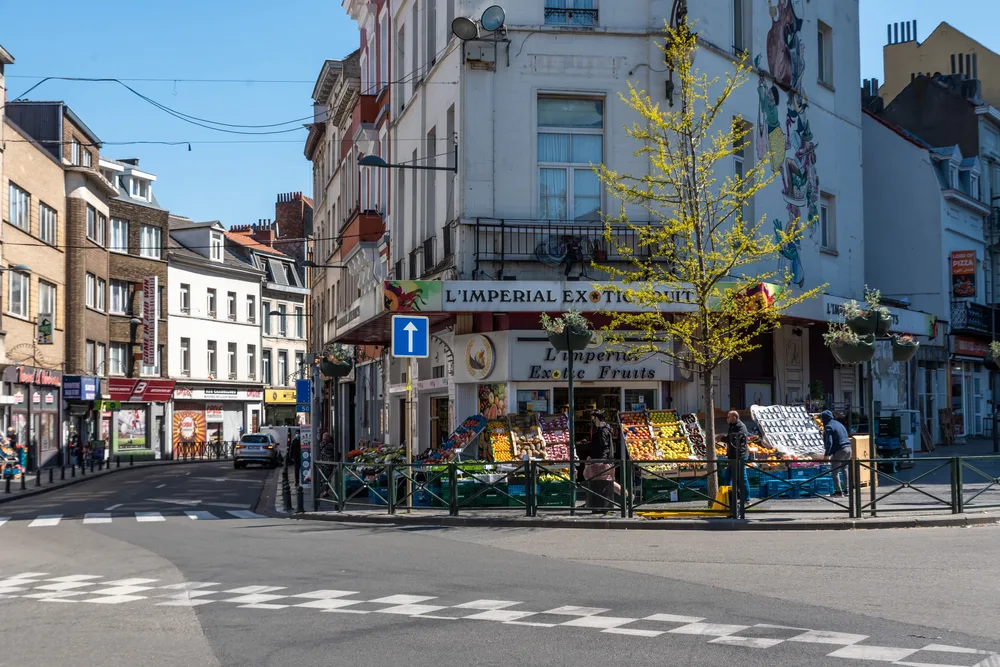
Saint- Josse, Brussels Capital Region – Belgium – 04 26 2021 – The chaussee de Louvain and the Saint Josse multi cultural square/Werner Lerooy/Shutterstock
Brussels, like any urban area, has some sketchier areas. Be careful around the train stations, especially around Brussels Midi, which has a red light district around it at night.
Brussels also has some more dangerous areas such as Saint Josse, Liedts-Cage Aux Ours, and parts of Marolles and Molenbeek. Antwerp is seeing an increase in drug crime.
You can still visit but avoid the area around Antwerpen-Centraal at night or the “window streets” (red light district). If you notice something feels sketchy, leave right away. The town of Charleroi also has a higher than average crime rate.
Things to Consider
Here are some additional safety tips for Belgium:
- Be sensitive to the language issue. Belgium is trilingual: French, Flemish, and German are spoken throughout the country. However, the country is divided between its French and Flemish-speaking regions and people might get offended if you speak the wrong language. When in doubt, stick to English.
- Pickpockets operate on popular international train routes. Make sure your valuables are always secure or placing bags at the end of your corridor.
- Avoid driving in Brussels. Not only is the traffic terrible, but theft from vehicles is common.
- Women should exercise extra caution in Belgium. Catcalling and verbal harassment is sadly common, especially at night.
Frequently Asked Questions
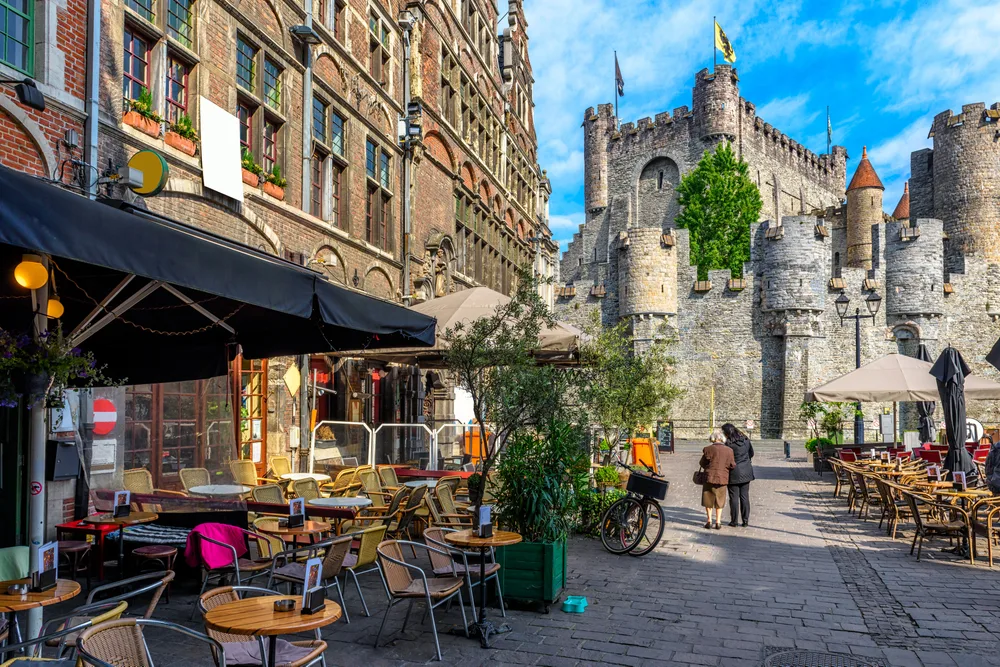
Catarina Belova/Shutterstock
Here are a few commonly asked questions about Belgium:
Is Belgium safe to walk around?
Belgium is mostly safe to walk around! Its towns and cities have pedestrian cores that are filled with people and a pleasure to walk around. Just be careful not to go into poorly lit areas after dark.
Is Brussels safe to walk at night?
Brussels, Belgium’s capital, is safe to walk at night — depending on where you go. As with anywhere, there are some areas that have higher rates of crime at night. Stick to well-lit streets with lots of other travelers.
Is Belgium a safe country?
For the most part, Belgium is a safe country. It has its problems, such as a rising crime rate and occasional terrorist attacks, but it is mostly safe.
Is Belgium worth visiting?
Belgium is absolutely worth visiting! It has stunning architecture, beautiful towns, and a fun food culture.
Are Belgians friendly to foreigners?
Belgians don’t have the same reputation for hospitality as southern European countries do. However, they are polite and welcoming to tourists.
So, Should You Travel to Belgium?
You will have to exercise some precautions when you visit Belgium. The terrorist alert level is slightly elevated, and petty crime is common in cities. However, for the most part, visits to the country are very safe.
So, with so much rich history and local culture abounding everywhere in the city, what are you waiting for — book your trip today to experience for yourself all that Belgium has to offer!



